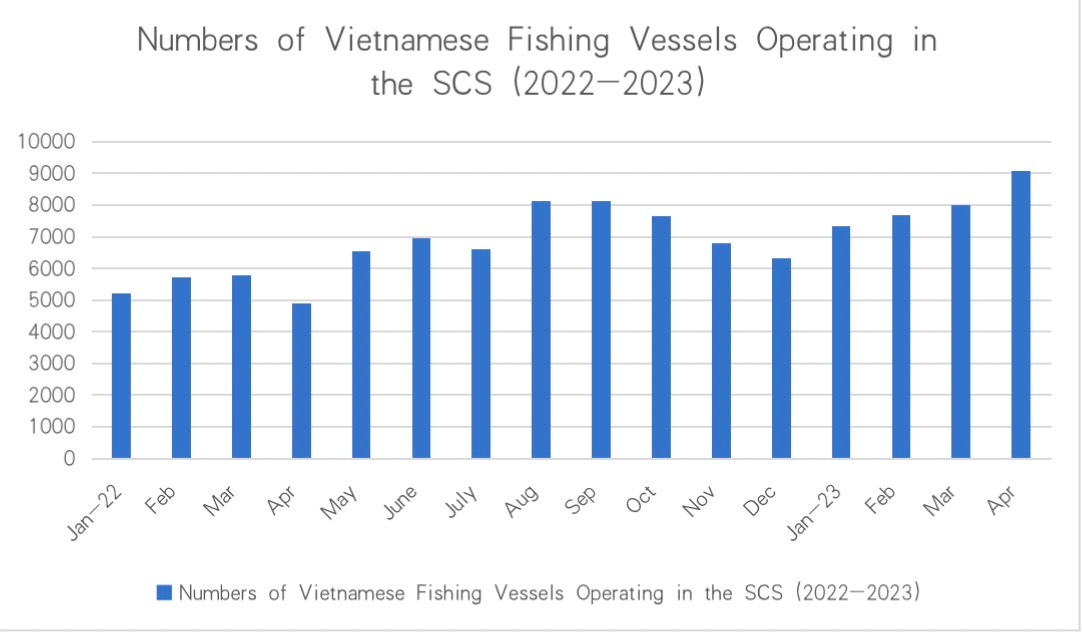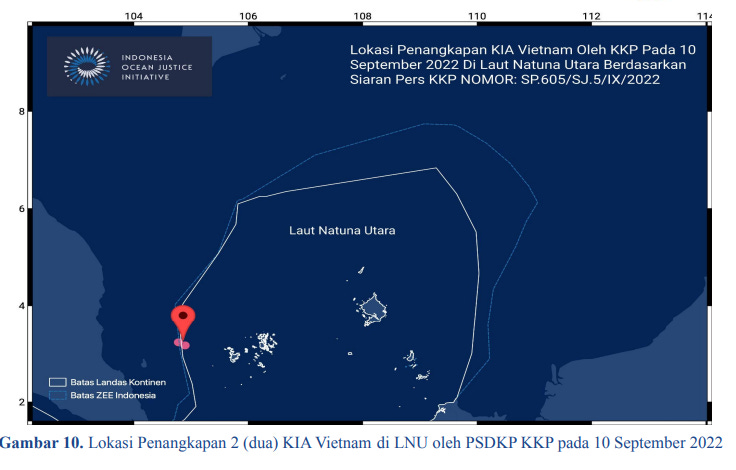Vietnam's illegal fishing in South China Sea unabated in 2022
Vietnam needs to rein in illegal, unreported, and unregulated (IUU) fishing, a South China Sea Strategic Situation Probing Initiative (SCSPI) report says.
The South China Sea Strategic Situation Probing Initiative (SCSPI), launched by Chinese scholars and led by Hu Bo, research professor & director of the Center for Maritime Strategy Studies, Peking University recently published Illegal Activities of Vietnamese Fishing Vessels in the South China Sea Intensify in 2022.
The report is by Song Runxi, Assistant Research Fellow for the Center for World Navy Studies, National Institute for South China Sea Studies (NISCSS), and Wang Tengfei, staff of the Research Center for Ocean Law and Policy at NISCSS.
Upon SCSPI’s generous authorization, The East is Read shares the report here, which has been edited for brevity.
Illegal Activities of Vietnamese Fishing Vessels in the South China Sea Intensify in 2022
The problem of illegal, unreported and unregulated (IUU) fishing by Vietnamese vessels in the South China Sea remained unabated throughout 2022, exacerbating tensions over fishing rights between Vietnamese fishermen and Malaysian and Indonesian maritime authorities.
AIS [Automatic Identification System, which uses transceivers on ships to track vessel traffic] shows that Vietnamese fishermen operate an average of 7000 fishing vessels per month in 2022. The number of active Vietnamese fishing vessels have also been rising in the first quarter of 2023, with the April figure reaching as high as 9089.
Source: SCSPI
Vietnam's Fishing Disputes with Indonesia
According to incomplete data, there were 6 fishery conflicts between Indonesia and Vietnam in 2022, and another from January to April 2023. A total of 11 Vietnamese fishing boats and 128 Vietnamese fishermen were seized in Indonesian waters in 2022. On July 18, 2022, the Indonesian Ministry of Marine Affairs and Fisheries (KKP), in cooperation with the Directorate General of Immigration and the Ministry of Foreign Affairs, repatriated 17 Vietnamese crew members involved in illegal fishing.
Location where Indonesia arrested two Vietnamese fishing boats on Sept. 10, 2022.
Source: Indonesia Ocean Justice initiative
Although there were fewer reported fishing disputes and instances of Indonesia seizing illegal Vietnamese boats in 2022, this does not necessarily indicate a reduction in Vietnamese illegal fishing incursions into the area. A significant number of Vietnamese boats continue to illegally fish in Indonesian waters, much to the concern of local fishermen and environmental groups. For instance, Indonesian fishermen from the Natuna Islands reported to authorities that they regularly came across Vietnamese vessels illegally operating in the area. They alleged that these Vietnamese boats had damaged local fishing grounds and greatly decreased their catch. As a result, Indonesian fishermen urged their government to increase monitoring and security in these waters.
According to a report by the Indonesian Ocean Justice Initiative (IOJI), 321 illegal Vietnamese fishing boats were spotted in Indonesian waters through AIS between February and September 2022. The number of Vietnamese fishing vessels peaked in May, with more than 60 vessels. The actual number is likely even higher, as some Vietnamese fishing vessels would turn off the AIS signal while operating at sea. In addition, IOJI said Vietnamese fishing boats usually engage in pair trawling. This involves two boats sailing parallel to each other, 300 to 400 meters apart. The use of certain prohibited fishing equipment in this manner can cause systematic damage to the sustainability of marine fisheries.
Number of Vietnamese fishing boats detected in Indonesia’s “undisputed” exclusive economic zone in 2021-2023
Source: Indonesia Ocean Justice Initiative
In recent years, Indonesia's maritime authorities have had fewer patrol boats and a tighter budget, thus reducing the intensity and coordination of their patrols. As a result, Vietnam's illegal fishing activities have become more reckless. To address the problem, on April 10, 2022, KKP announced that it would build two 50-meter-long fishery monitoring ships with “anti-illegal fishing” technology by the end of the year to better combat illegal fishing. Meanwhile, KKP submitted a proposal through the Directorate General of Marine and Fishery Resources Supervision (Ditjen PSDKP) to establish an intelligence network on fisheries in the ASEAN region. The goal was to strengthen deterrence and law enforcement to eradicate illegal fishing activities.
Moreover, during Vietnamese President Nguyễn Xuân Phúc’s state visit to Indonesia from December 21 to 23, 2022, Indonesian President Joko Widodo expressed his hope that the two countries could reach an agreement on aquaculture industry cooperation and join efforts in combating IUU fishing as soon as possible. Together, the two Presidents announced the completion of 12 years’ negotiations on Vietnam-Indonesia Exclusive Economic Zone (EEZ) delimitation. However, judging from the current situation, this did not ease the fishing tensions between the to countries. On April 19, 2023, IOJI said this year’s movement patterns of Vietnamese fishing boats and Hanoi’s state-owned vessels in the North Natuna Sea showed little to no difference compared to pre-EEZ period. The think-tank has been tracking the movements since January.
Vietnam's Fishing Disputes with Malaysia
According to incomplete data, there have been 21 fishing-relevant disputes reported between Malaysia and Vietnam, 4 of which occurred from January to April 2023. Malaysia detained over 28 Vietnamese illegal fishing boats and over 300 Vietnamese fishermen in 2022.
Although Malaysia and Vietnam have set up a joint development zone in the disputed area east of Malaysia’s West Coast and in the gulf of Thailand in 1992, few concrete arrangements were put in place to resolve the disputes. In April 2021, the Malaysian Maritime Enforcement Agency (MMEA) and the Vietnam Coast Guard agreed to sign a memorandum of understanding (MoU), aimed at “addressing encroachment by Vietnamese fishermen, especially in the East Coast waters, through information sharing such as using AIS.” Recent observations, however, show that Vietnamese fishermen’s trespassing fishing continues. According to a senior officer of MMEA, attempts to encroach on Malaysia’s water borders have increased drastically and alarmingly after Malaysia opened the country’s borders on 1 April. For example, Vietnamese fishermen were reported fishing near Tioman Island on the Malaysian East Coast.
Fortunately, the fishery disputes between Malaysia and Vietnam were generally under control in 2022 and did not contaminate other aspects of bilateral relations, in that here has been no open confrontation between the maritime law enforcement forces of Vietnam and Malaysia. But frictions are inevitable in the process of law enforcement. On June 11, Kudat MMEA encountered resistance when trying to arrest a Vietnamese fishing boat with 41 crews. The ensuing collision resulted in serious injuries to two Vietnamese fishermen.
Similar to the case in Indonesia, MMEA has an exacerbated shortage of enforcement vessels due to COVID-19, which, to some extent, has fueled IUU activities by foreigners. Currently, MMEA has 70 vessels and 190 boats nationwide, but most are obsolete and unreliable. The agency was supposed to receive at least one new offshore patrol vessel (OPV) in September 2022 after the government previously granted an 18-month extension to TH Heavy Engineering to complete all three OPVs under construction. The first of the three OPVs was not delivered until October 2022.
The Royal Malaysian Navy (RMN), on the other hand, has taken an increasingly active role in fisheries law enforcement. Leveraging advanced information technology and interagency coordination, RMN’s KD Admiral Hang Nadim cracked down on foreign fishing boats on July 23, 2022, expelling them from Malaysian waters. On 17 October, 2022, RMN’s KD Pendekar detained a Vietnamese fishing boat with 15 crews. In addition, the Malaysian military and the law enforcement agencies attach great importance to coordination. On 22 March, 2023, MMEA’s patrol ship KM Jujur intercepted two Vietnamese fishing boats based on information provided by a Royal Malaysian Air Force (RMAF) maritime patrol aircraft team.
Vietnam's IUU Activities in South China Sea
In fact, IUU fishing activities of Vietnamese fishing boats are even more rampant in northern South China Sea (SCS). Maps from the South China Sea Strategic Situation Probing Initiative (SCSPI) reveal thousands of Vietnamese vessels present in 2022 within China's territorial waters and internal waters off Hainan Island, Guangxi and Guangdong. The IUU fishing poses threats and challenges to maritime cooperation, fishery resources conservation, and security of neighboring countries. Significant work remains to achieve sustainable fisheries management and conflict resolution in the SCS.
In the first 10 months of 2022, Vietnam profited $9.5 billion from fisheries exports, up 34 percent from the same period last year. In October 2017, the European Union (EU) issued a “yellow card” warning against Vietnam’s persistent fishing violations. In order to lift the card, the Vietnamese government has introduced a series of rectification measures, but the implementation remains problematic. In 2018 and 2019, European Commission (EC) delegation conducted on-site inspections of Vietnam’s efforts in combating illegal fishing, recommending improvements for insufficient implementation. Due to the pandemic, the EC inspection team did not visit Vietnam again until the end of October 2022. Meanwhile, preventing Vietnamese local fishing boats from illegally fishing in other countries’ waters was again proposed by the EU officials after the inspection. The EC mission said it will continue with inspection and assessment in Vietnam in another six months before deciding whether to revoke the “yellow card”.
Overall, the Vietnamese government has taken steps to tackle IUU fishing in the SCS, but the results are modest. Sustainable development of marine fishery resources in the SCS are the vital interests of coastal states and fishermen. The Vietnamese government needs to continue facing up to the IUU fishing problem, take effective measures to strengthen its fishery management, raise fishermen’s law-abiding awareness, enhance the ability to inspect, control and supervise illegal fishing activities, and fulfill corresponding international obligations.
(For detailed references, check the original post at South China Sea Strategic Situation Probing Initiative.)





